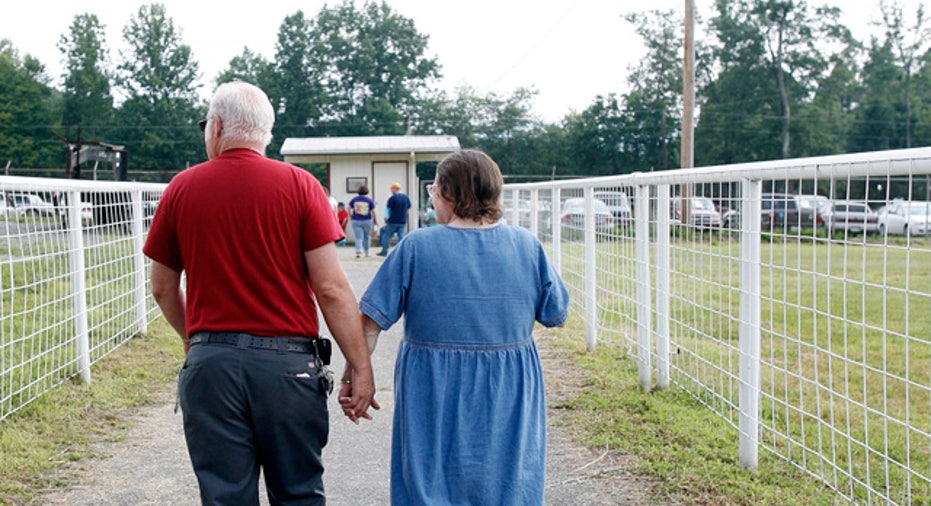Why We All Need Anxiety in Our Lives

I go to Starbucks, I see it. I go buy tomatoes, there it is. I go for a hair cut, it stares at me from the sides of bus stops.
Fearless, an Anxiety Free Life
This slogan is printed on posters that are hung around my town. Every time I see it I think it sounds like an advertisement for an anti-depressant. It brings to mind those commercials where you see a person wandering through a field of flowers or strolling on a pristine beach.
At best I think numb, at worst I think zombie.
The thing is, these posters are actually promoting a church.
To be clear, I applaud people gathering and sharing their faith and I know this is a well-intentioned slogan to draw people in. This church sounds like a lovely place to connect and pray.
But all that said, those words make me crazy. They evoke a life lived minus challenges or risks of any kind. In fact, I strongly suggest if you are living anxiety free every day, week after week, year after year, it’s time to re-evaluate your life.
Back in the 1990s, I remember listening to the tapes of Dr. Ellen Kreidman in my car and being fascinated by her explanation via anecdote of how fear works. You might, for example, enlist your friend to help you make an exchange at a store because you’re fearful of confrontation and you perceive this friend as fearless in this area. Actually, she has fear around it, too. She’s choosing to get beyond it.
You don’t see books with author Susan Jeffers’ name on them telling you to live without fear. She’s telling you to Feel the Fear and Do It Anyway. Big difference.
“The fear will never go away as long as you continue to grow!” Jeffers tells us on her website. “Every time you take a step into the unknown, you experience fear. There is no point in saying, ‘When I am no longer afraid, then I will do it.’ You'll be waiting for a long time. The fear is part of the package.”
Yes. It’s not about eliminating fear. It’s about having it and working through it. Having it and staring it down. Telling it to take a hike because you just absolutely need to give the speech, run the race, tell your spouse you can’t live like this anymore, ride without the training wheels, try the bold red wall in the living room, take a shot and ask her out.
Come on. Where’s the triumph without the fear first? That butterfly messing with your stomach, that lump taking up too much space in your chest, that feeling of debilitating hesitation. Then poof. A step. A plunge.
Anxiety free? Who wants that?
Don’t get me wrong. I’m not advocating being in a constant state of angst. That’s a formula for disaster.
But in my almost daily dealings with people on a professional level, fear is repeatedly and blessedly a factor. If I’m interviewing someone to write about them for this column, they have typically overcome some kind of fear – i.e., starting their own business, drastically changing career paths. From another angle, if I’m coaching someone, part of our work together usually requires the client overcoming fear, perhaps of failure or of revealing too much in his art.
Just a few weeks ago I interviewed a woman who, in her late 40s, is experiencing the greatest professional fear of her life with a new venture. And she’s loving it despite the trepidation coming at her on a consistent basis. One of my favorite stories told by a celebrity cook is how she’s always felt that if something doesn’t keep her up at night, it’s probably not worth doing.
Do a Google search on Meryl Streep and fear and you’ll find her periodic mentions of it. Fear that her career was over at age 40 (she’s now 62 and nominated for yet another Academy Award for the lead role in Iron Lady). How she learned at Yale drama that fear is “your friend.” How even as recently as this past month she talked about her fear of failure.
“I think about failure. Absolutely, day-to-day and moment-to-moment,” Streep said.
And yet she seems to be doing OK, don’t you think?
This might be a tangent based on a poster, but it feels grounded in legitimate concern based on how our citizens are going to their doctors in droves to get medicated to alleviate their daily anxiety. Among her 10 Strides from Fear to Freedom, I particularly like this one from Dr. Ellen Weber.
“Attempt to do the thing that causes persistent fear,” she writes. “Start slowly, and you’ll gradually gain mental freedom that creates courage to do more of the same.”
If there’s no fear, there’s no courage. What kind of life is that?
Nancy Colasurdo is a practicing life coach and freelance writer. Her Web site is www.nancola.com and you can follow her on Twitter @nancola. Please direct all questions/comments to FOXGamePlan@gmail.com.



















